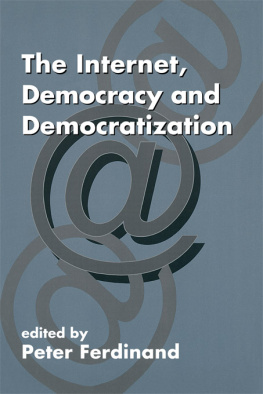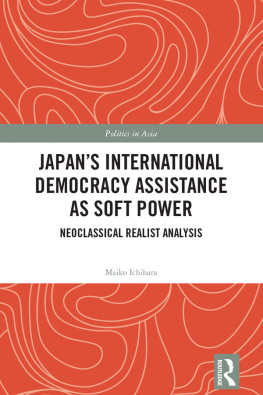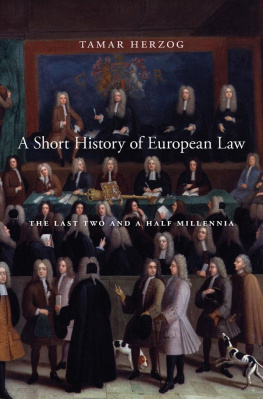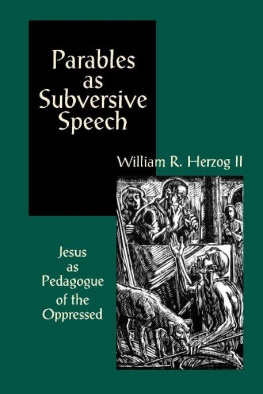JAPAN'S PSEUDO-DEMOCRACY
First published 1993 by RoudedgeCurzon
Published 2013 by Routledge
2 Park Square, Milton Park, Abingdon, Oxon OX14 4RN
711 Third Avenue, New York, NY 10017 USA
Routledge is an imprint of the Taylor & Francis Group, an informa business
Peter J. Herzog 1993
All rights reserved.
No part of this publication may be reproduced or transmitted in any form or by any means without permission from the publishers, except for the quotation of brief passages in criticism.
British Library Cataloguing in Publication Data
A CIP catalogue entry for this book is available from the British Library
ISBN 1-873410-07-7 (Limp)
1-873410-09-3 (Case)
Set in Plantin Roman 10 on 11 point
Keywork by Ann Tiltman
Typesetting by Visual Typesetting, Harrow, Middlesex
Publisher's Note
The publisher has gone to great lengths to ensure the quality of this reprint but points out that some imperfections in the original may be apparent
A conspicuous development since the end of the Second World War has been Japan's political and economic integration into the West. The post-war Occupation provided the initial impetus for this transformation which found a practical as well as symbolic expression in the adoption of the present constitution. The defeat had totally discredited the prewar and wartime ideology, yet the attempt to fill the void resulting from the demise of the old order by the creation of a Western-style democracy has been unsuccessful. The reforms initiated by the Occupation and the implementation of the post-war constitution have created a number of democratic institutions but these alone do not necessarily impart the convictions and attitudes from which they originated.
The pattern in which Western democracies have organised public order shows a considerable variety and it is impossible to consider a particular form as definitive. There are, however, some fundamental ideas essential to democracy. As a kind of political creed, democracy admits of a wide latitude in detail but contains some core requirements without which it becomes a sham.
A characteristic of modern democracy is the demarcation of a sphere of individual inviolability and circumscription of the possible interference by the state in people's private affairs. The 'Bill of Rights' not only defines the prerogatives of the individual but also ensures him or her membership in a political society based on the idea of free cooperation between equal members. The liberal conception of democracy demands freedom and equality for all members as an indispensable condition. It would be wrong to consider these rights merely in relation to the individual; they represent a necessary element of that form of political existence which the constitution is meant to organise. The recognition of these rights is just as essential to the state as it is to the individual citizen.
In Western countries with a strong democratic tradition, democracy is not just a political system but a way of life. The people are familiar with the institutions, values and preferences peculiar to a democratic system. Japan is not without democratic traditions but these never affected the political life of the nation as a whole. The Japanese state under the Tokugawa and Emperor Meiji was a highly centralised, bureaucratic, omnicompetent government state whereas Japan's democratic traditions never transcended the sphere of local use. What is often referred to as the 'Taisho democracy' (Taisho era: 1912-1926) was the short-lived ascendancy of bourgeois politicians under a system of restricted male suffrage. The leading zaibatsu , Mitsui and Mitsubishi, greatly strengthened by the prosperity resulting from the First World War, manipulated the political parties to promote their business interests. The Taisho period also brought the awakening of the working classes and the first attempts (forcefully suppressed by the police) to organise labour unions and proletarian parties. These movements had little connection with Anglo-American democracy, and of the parties organised after the Second World War, only the Socialists and Communists had some tenuous personal and ideological links with the Taisho movements.
Japan's democratisation as envisioned by the Occupation constituted a radically new beginning - and the new order had to be imposed on a society completely unfamiliar with the values, ideologies and institutions enshrined in the constitution. Japan differed from Germany in that the national and local bureaucracies remained largely intact after the war so the new dispensation had to be implemented by an administration educated in an entirely different environment and at least partly hostile to the new order. The constitution and the legal and organisational measures based thereon were applied and interpreted by a judiciary unfamiliar with the origin, intent and meaning of the constitutional provisions. The disparity between the old and new dispensation was too acute to allow a smooth transition. It would have been overly sanguine to expect a thorough understanding of the new order to emerge at once. There was some opposition to the changes involved in the country's democratisation (e.g. the position of the Emperor, the family system, the renunciation of military forces) but no large-scale obstructionism.
It can hardly be maintained that at present democracy is flourishing in Japan. The most appalling lack of democratic consciousness and deplorable manifestations of undemocratic behaviour can be seen among politicians, while the bureaucracy must be blamed for preventing a more democratic ambience in Japan's national and international relations.
Lack of understanding has been an important factor affecting the progress of democracy. The judiciary has been called upon to document its comprehension of democracy in many cases involving the interpretation of the constitution. On a number of controversial issues, the courts have taken positions which I consider incompatible with democratic principles and their interpretation of the constitution has not always conformed to democratic values and convictions.
The present volume discusses some of the discrepancies with the Western understanding of democracy found in Japan. An examination of economic democracy is beyond the scope of this enquiry.
Chapter 1
How democratic is Japan's constitution?
The enactment of the 'Constitution of Japan' ( Nihon-koku Kemp ), promulgated on 3 November 1946 and effective six months later, formed an essential step in the process of democratisation, one of the key projects of the post-war Occupation. It has often been pointed out that expressions such as 'democracy', 'democratic' or 'democratisation' do not appear in the text of the document. The preamble asserts that 'sovereign power resides with the people' and proclaims as a 'universal principle of mankind' that 'Government is a sacred trust of the people, the authority for which is derived from the people, the powers of which are exercised by the representatives of the people, and the benefits of which are enjoyed by the people.' This sentence states the basic tenets of a representative democracy which leaves no doubt that Japan's constitution was meant to be the charter of a democratic state.














